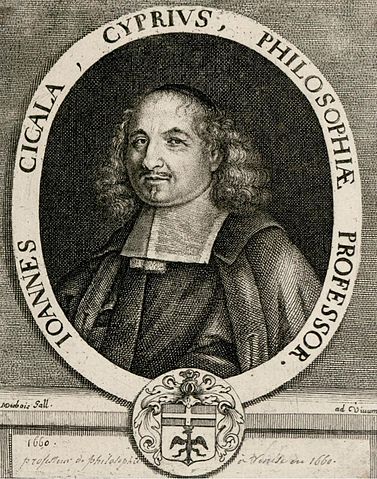 |
This is a file from the Wikimedia Commons. Information from its description page there is shown below.
Commons is a freely licensed media file repository. You can help.
|
Summary
| DescriptionIoannis Kigalas (1622-1687) Cyprus.jpg |
English: Ioannis Kigalas (Greek: Ιωάννης Κιγάλας), (Italian: Giovanni Cigala, Cicala), (Latin: Joannes Cigala; ca. 1622 – ca. 5 November 1687) was a Greek Cypriot scholar and professor of Philosophy and Logic who was largely active in Padova and Venice in the 17th century Italian Renaissance. Inscription: IOANNES CIGALA, CYPRIVS, PHYLOPSOPHIAE PROFESSOR
|
| Date |
1660 |
| Source |
http://www.banqueimages.crcv.fr/search.aspx?showtype=single&first=3&token=&type=search&searchform=&advanced=&sortField=&searchfield1=*&query1=cigala&searchfield2=&query2=&searchfield3=&query3=# |
| Author |
Martial Desbois (1630-1700) |
Border cropped
Licensing
| Public domainPublic domainfalsefalse |
 |
This image (or other media file) is in the public domain because its copyright has expired.
This applies to Australia, the European Union and those countries with a copyright term of life of the author plus 70 years.
 You must also include a United States public domain tag to indicate why this work is in the public domain in the United States. Note that a few countries have copyright terms longer than 70 years: Mexico has 100 years, Colombia has 80 years, and Guatemala and Samoa have 75 years, Russia has 74 years for some authors. This image may not be in the public domain in these countries, which moreover do not implement the rule of the shorter term. Côte d'Ivoire has a general copyright term of 99 years and Honduras has 75 years, but they do implement the rule of the shorter term. You must also include a United States public domain tag to indicate why this work is in the public domain in the United States. Note that a few countries have copyright terms longer than 70 years: Mexico has 100 years, Colombia has 80 years, and Guatemala and Samoa have 75 years, Russia has 74 years for some authors. This image may not be in the public domain in these countries, which moreover do not implement the rule of the shorter term. Côte d'Ivoire has a general copyright term of 99 years and Honduras has 75 years, but they do implement the rule of the shorter term.
|
|
This file has been identified as being free of known restrictions under copyright law, including all related and neighboring rights.
|
File usage
The following pages on Schools Wikipedia link to this image (list may be incomplete):
This selection has made Wikipedia available to all children. SOS Children believes education is an important part of a child's life. That's why we ensure they receive nursery care as well as high-quality primary and secondary education. When they leave school, we support the children in our care as they progress to vocational training or higher education. Why not try to learn more about child sponsorship?



